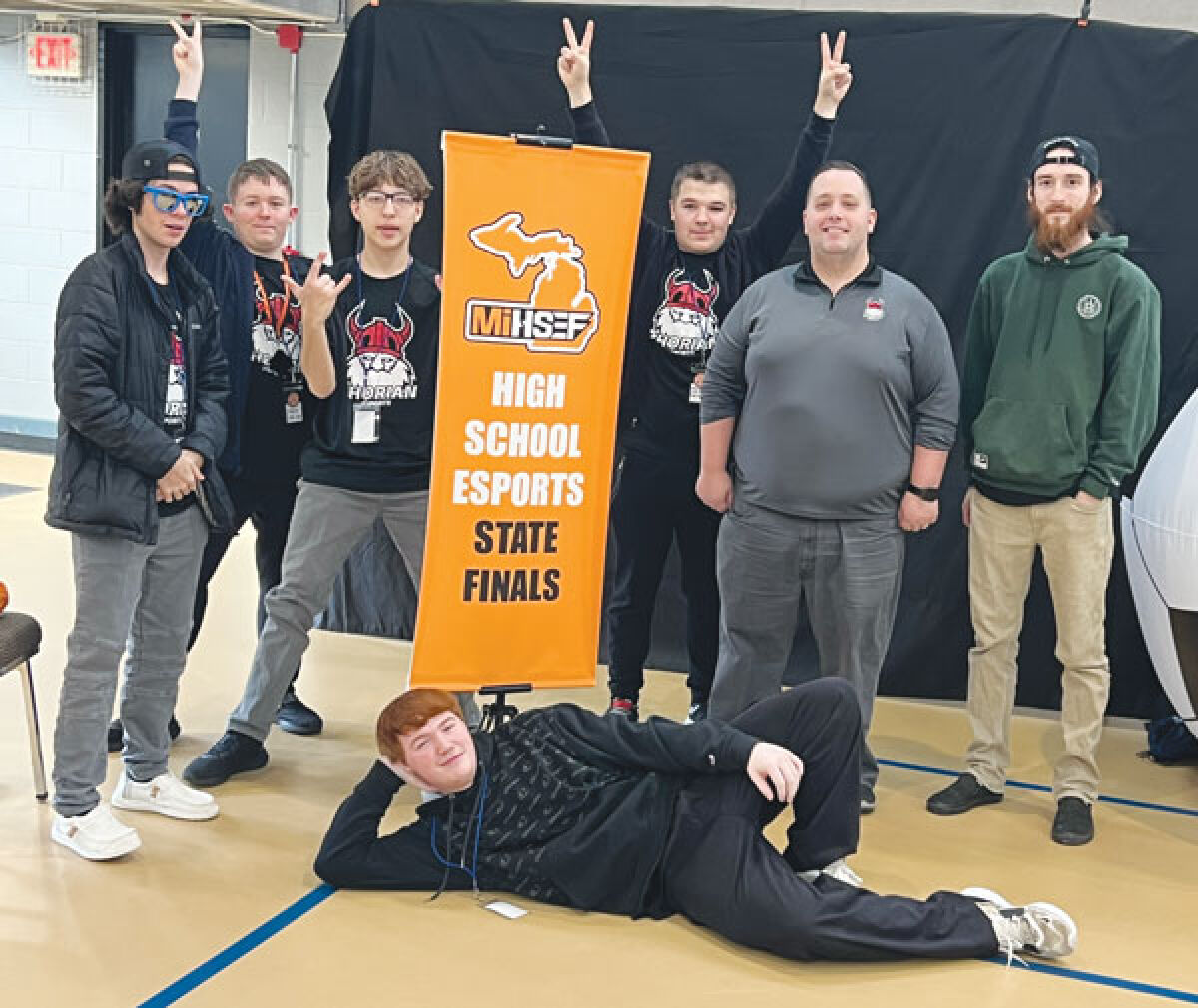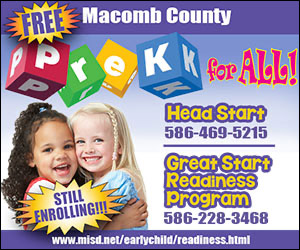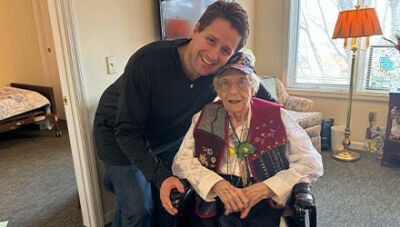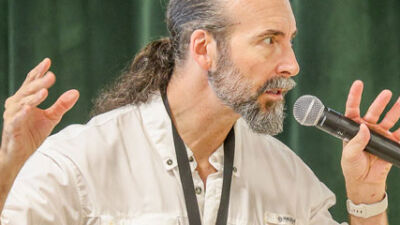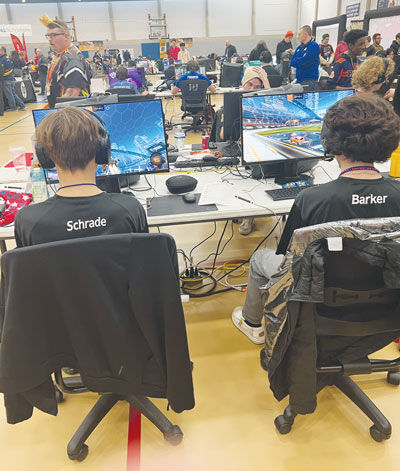
St. Clair Shores Lake Shore sophomore teammates Blake Schrade and Jacob Barker compete in Rocket League.
Photo provided by Shayne Trail
ST. CLAIR SHORES — When St. Clair Shores Lake Shore esports is competing against an opponent, whether it be online or in-person, odds are you can find head coach Shayne Trail with a big smile on his face as he’s motivating his team.
“What I tell the kids is I just want to be that dad cheering you on in the background,” Trail said. “My goal is to make the student driven.”
Trail, a resource room math teacher at Lake Shore High School, has an extensive history of competitive gaming on his own before starting the inaugural esports team at the high school.
While serving in the United States Navy, Trail began competitively gaming in Call of Duty, a first-person shooter game, before expanding to other games that caught his attention such as League of Legends and Smite, both battle arena games in their own right.
Trail’s competitive gaming resume also included being a community member for the esports organization vVv (Vision.Valor.Victory.) Gaming and serving as a general manager for MadCap Gaming.
Given his background in gaming and already being a member of the Lake Shore faculty, it wasn’t a difficult decision for principal Janelle Bross to greenlight an esports program.
“I asked her about her thoughts on esports and she said, ‘You know what, we actually tried to get a team started before the pandemic and now the teacher is gone. Are you interested?’” Trail said. “I said, ‘Uh, yeah. Obviously.’” That’s how it all started.”
The high school esports scene is comprised of two leagues: the Michigan High School Esports League (MHSEL), sponsored by a youth esports platform called PlayVS, and the Michigan High School Esports Federation (MiHSEF), a nonprofit organization run by teachers.
The high school esports year is split into two seasons (fall and spring) with teams competing against other schools all over the state of Michigan, and even across the United States when the playoffs roll around.
In Lake Shore’s first official season, the program fielded teams in NBA 2K, Madden NFL, Rocket League, Super Smash Bros, Mario Kart and Valorant. Every team made it to the playoffs with NBA 2K reaching the regional semifinals in an area made up of the entire East Coast of the United States, while one Rocket League team took fourth out of 80 teams at the MiHSEF in-person state finals at the University of Michigan-Flint.
Jacob Barker, a sophomore on the fourth-place Rocket League team, said the program has been an exciting thing to be a part of.
“I think it’s been pretty awesome,” Barker said. “I’ve been here since Day 1 of making it, so I’ve seen everything. It’s come a long way and it’s going to go a lot farther.”
Barker, along with sophomore teammates Blake Schrade and Brendan Godawa, came back in the spring season for Rocket League and were ranked No. 3 in the state in the MHSEL, posting a 13-2 record with both losses coming to Linden High School, a perennial state champion in Rocket League.
Barker, Schrade, and Godawa have all known each other since sixth grade, so the chemistry is unmatched between the trio.
They have two league games during the week and a mandatory practice on Sunday nights where they strategize and go over different game plans.
For a game that was once a casual play with the three friends, Barker said being in esports has elevated his ability in Rocket League.
“It definitely has changed a lot,” Barker said. “In 3v3 ranks, I was probably low champ. This season, I only played with my two teammates, Blake and Brendan, and I’m pushing C3 right now. It makes it a lot easier.”
That’s the humble answer. To put it in a broader sense, Barker, Schrade, and Godawa can beat just about anyone they go up against.
For those unfamiliar with Rocket League, there’s 23 ranks with Supersonic Legend being the highest and unranked being the lowest. For perspective, a Champion III (C3) is the fifth-highest rank in the game.
In the MiHSEF, the trio is ranked No. 2 in the state and is looking to compete once more at the in-person state finals on May 4th at the University of Michigan-Flint, where the top-16 Rocket League teams go head-to-head.
Lake Shore will also have its Super Smash Bros team ready to represent as well, battling it out against 32 other teams at the state finals. Sophomore Landon Tuladziecki, sophomore Katelyn Zelenak, freshman Connor Grosso, junior Stephen Mosley, and junior Antonio Gamicchia compete for the Lake Shore Super Smash Bros team.
Atmospheres like the in-person state finals are what esports players dream of with the audience cheering, people watching your every move with hesitation and excitement, and being surrounded by others who are just as passionate as they are about esports.
Barker said because of the role video games play in the lives of students today, he expects Lake Shore’s numbers to increase, especially if they can feel the atmosphere of it.
“Video games are a big part of my generation’s childhoods, and I just think a lot of kids are going to join,” Barker said. “I know a lot of people are already going to stick through it. It’s only going to go up.”
The esports players are eligible for varsity letters, which take around two years to qualify for depending on the player.
Trail said Lake Shore has been more than gracious to the esports program, letting them use the administration center with 12 computers and four Nintendo Switch devices where the team will livestream games throughout the week.
The players drop their backpacks and forget about the day when they enter the gaming room, and that feeling of relaxation and decompressing is a big reason why the program already has 36 kids in its first official year.
With the success of the program and the gaming environment Trail has created, expect Lake Shore to be a major player on the high school esports scene for years to come.
“I’m taken back by it (the numbers),” Trail said. “It’s one of those proverbial cliches of ‘If you build it, they’ll come.’ That’s really what it is. We built it, the admins support it, and the kids are willing to come. I’m fortunate to say now that we’re in a position where we can have conversations on how we can build this out more.”
 Publication select ▼
Publication select ▼